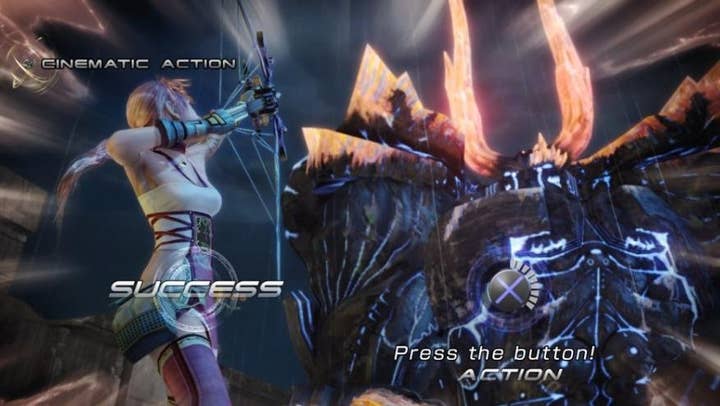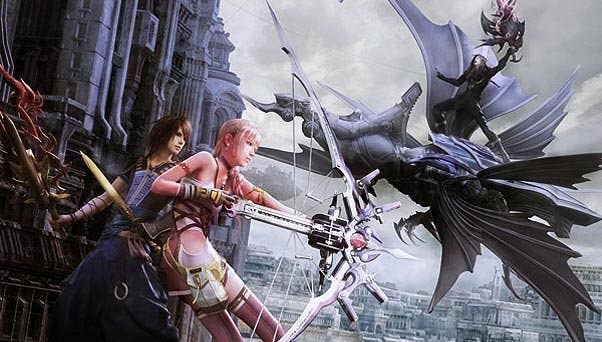Critical Consensus: Final Fantasy XIII-2
If 80+ on Metacritic is good, why is everyone so ashamed of Final Fantasy XIII?
Consider this for a moment: Final Fantasy XIII's Xbox 360 and PlayStation 3 versions garnered Metacritic averages of 82 and 83 respectively. These are commendable averages, the sort that most developers aspire to reach, yet every single one of the dozen or so Final Fantasy XIII-2 reviews I have read are prefaced with a paragraph about its predecessor dropping the ball.
Did Final Fantasy XIII receive undeserved praise based on the long, esteemed history of the franchise? I wouldn't like to say, but, as Eurogamer's Simon Parkin points out, there are times when XIII-2 seems like an elaborate, interactive apology.
"[Final Fantasy XIII] presented a journey so focused and linear that its first 25 hours could be mapped out as an unbroken corridor," Parkin writes in his 8 out of 10 review. "In Final Fantasy XIII, both towns and exploration were discarded as extraneous trappings, unnecessary to [protagonist] Lightning's mission or - as it was referred to in the game's terminology - her Focus. Rarely has a game been so focused as to discard so much of its own heritage."

The push for player freedom is also evident in the return of towns and their attendant side-quests. And, perhaps conscious of the fact that recommending Final Fantasy XIII required the largest caveat in the history of videogames - "Just get past the first 25 hours and it really opens up" - Square Enix has built the sequel on a premise that demands immediate and widespread exploration: Serah is searching for her sister, Lightning, who is being held captive somewhere in an alternate timeline.
"Only by venturing back and forth through time, dipping in and out of different realities and solving anomalies, can history's true course be unravelled and Serah be reunited with her sister," Parkin continues. "It's a good structure that, perhaps more than any Final Fantasy game before it, allows you to feel as though the journey is your own."
Nevertheless, Parkin describes FFXIII-2's designers as "lab technicians", studiously righting every perceived wrong with their previous work. "Final Fantasy XIII-2 may be billed as a sequel, but in truth, it's a multi-million-yen apology, and its creators should be praised for their readiness to make amends - even when those attempts miss the mark."
Final Fantasy XIII-2 may be billed as a sequel, but in truth, it's a multi-million-yen apology
Simon Parkin, Eurogamer
Parkin's assertion that Square Enix should be commended for their approach isn't really fleshed out, and Joystiq's Jason Schreier approaches the same point from a different angle. These days, Schreier argues in his 3-star review, Final Fantasy has lost the sheen of greatness - "Final Fantasy is more punchline than powerhouse, more quantity than quality."
"Final Fantasy XIII-2 is the publisher's attempt to mend this relationship. At times, it feels like the development team just went down a laundry list and added everything that fans believed Final Fantasy XIII lacked. Non-linear dungeons? Check. Sidequests? Check. NPCs and towns? Check, check. In other words, the whole game seems like one big apology."
"All of these trappings help make Final Fantasy XIII-2 far more appealing than its predecessor, but they don't make it great. For every dazzling landscape or satisfying puzzle, there's a niggling flaw or baffling moment that will make you wonder why you're still playing."
A particular problem is the fiction; not the simple rescue-the-girl story, but the "nonsensical" and "confusing" nomenclature that adorns it. The plot quickly veers, "into the land of Weird Proper Nouns and confusing use of terms like 'artefact' and 'spacetime'... I lost interest around the tenth time something was explained as a 'paradox'."
Schreier claims that the dialogue and voice-acting are also below the standard gamers might now expect from a AAA product, with a shopkeeper called Chocolina the subject of disarming vitriol. "I would love to erase [Chocolina] from history... It's tough to relate to the motivations and desires of characters whom you want to smack in the head."

"As someone who has been playing Final Fantasy since before I could walk on two legs, I was particularly disgusted by Final Fantasy XIII-2's soundtrack. One of the series' greatest strengths has always been its elegant, sweeping harmonies and catchy, infectious tunes, but Final Fantasy XIII-2's music is average at its best moments and abominable at its worst."
"One particular boss theme (a scream-packed metal ballad) was so infuriating that I got up and muted my television until it was over. No title, Final Fantasy or otherwise, has driven me to do that before."
The hive-mind at Edge magazine were even less impressed by FFXIII-2, which is, "a baffling, boring and swampy thing to play" despite the thick layer of polish and obvious effort to address FFXIII's problems. Key to its downfall is "a lack of challenge," even in the numerous boss encounters.
"FFXIII-2 is the first game in the series with an adjustable difficulty mode - a choice between Normal and Easy - but even on Normal this is a very easy game indeed. Common enemies are walkovers, and despite often taking a good deal of punishment, bosses are rarely a threat."
"The time investment required to complete FFXIII-2 is huge, but our characters perished a mere handful of times. As an experiment, we left Serah and company to fend for themselves over the course of ten battles, with no player input. With an idle player character and two AI companions set up to attack and heal, our party emerged victorious from every fight."
And these fights look dynamite. They're awash with magic, speed, and cartoonish action. Orchestrating this beautiful carnage feels good
Gus Mustrapa, The AV Club
"The ATB system is still a fine achievement, and most of FFXIII-2's tweaks are smart ones, but there's just nothing worth fighting against. Only two bosses required retries throughout our entire run through. Meanwhile, the addition of QTEs, bringing a few simplistic flourishes at the end of big battles, does little to enhance your sense of satisfaction."
However, even among all those disparaging remarks and general sense of disappointment, Edge hints at the aspect of FFXIII-2 that received unanimous praise: the Active Time Battle System, which was also the saving grace of its predecessor. For The AV Club's Gus Mastrapa, the game can be criticised for a range of legitimate reasons, but the battle system and its "paradigm shift" mechanic is difficult to fault.
"Fights ebb and flow, shifting between combo-building attacks, defensive manoeuvres, and straight-up aggression," he writes in his B+ review. "And these fights look dynamite. They're awash with magic, speed, and cartoonish action. Orchestrating this beautiful carnage feels good."
And the lure of that beauty should not be underestimated. Final Fantasy is known for its bold, colourful art direction and lavish environments, and while Mastrapa admits that the plot "wallows in too much poorly sketched paradox," it gives rise to a diverse array of fantastic worlds.
"Players jump from Blade Runner dystopias to verdant monster lairs atop overgrown trees. A highpoint finds Serah and Noel at the edge of reality, where an ancient, sandy ruin bleeds into a vast starscape... Roadside diversions like this can make a journey feel worth taking, even when the final destination isn't all that hot and the company stinks."
